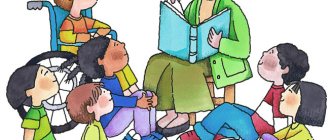The main directions of speech therapy work with children of preschool and school age.
For grades 1 - 4, the general education “Correctional Linguistic Course” of a special (correctional) school includes special subjects (“Pronunciation”, “Speech Development” (the world around us), as well as general education subjects adapted for students with speech pathology (“Teaching literacy ", "Phonetics, grammar, spelling", "Reading"). The goal of the course is: the formation of full-fledged speech activity as one of the most important prerequisites for successful learning and a means of adapting the individual in society.In accordance with this goal, the tasks of the correctional linguistic course in primary school are set: • filling the gaps of speech underdevelopment of children and the resulting impairment of speech-thought processes; • development and enrichment of ideas about the world around us as a basis for expanding the lexical and grammatical aspects of speech, coherent oral and written statements; • formation of skills and abilities necessary to speak, read meaningfully, listen and engage in speech activity at the level of written speech; • obtaining information on phonetics, grammar, spelling and initial ideas about literature. The subject “Speech Development” (the world around us) is integrated and includes elements of the basics of life safety. “Speech Development” (the world around us) is aimed at expanding ideas about the world around us, that is, it has a social orientation, therefore the “World Around us” curriculum is an integral part of the “Speech Development” program. The content of general education involves: • clarification and filling of specific ideas about the world around us, familiarity with natural and social phenomena; • improvement and formation of the skill of understanding coherent speech; creating a basis for mastering the written form of coherent speech: literary, popular science, journalistic, etc.; • development of understanding of colloquial speech, descriptive and narrative speech, grammatical structure of the language. The subject “Pronunciation” is aimed at developing clear, correct speech in students based on the development of phonemic perception, skills of analysis and synthesis of the sound composition of a word for mastering literacy. The task of pronunciation work is to develop clear, smooth, expressive speech, accompanied by correction of the prosodic side of speech, as well as work on the development of mobility and clarity of movements of the articulatory apparatus. The subject "Literacy" is a continuation of the subject "Pronunciation". The subject “Teaching literacy” assumes the following content: • filling gaps in preschool speech development; • preparation for mastering the sound composition of a word; • ability to navigate on a sheet of paper; • preparation and training in writing techniques; • students mastering conscious smooth syllabic reading, correct intonation when reading and telling. The corrective focus of the subject contributes to the development of auditory attention, development and correction of motor skills of small muscles of the hand. The subject “Phonetics, Grammar, Spelling” is aimed at consolidating the grammatical patterns of the native language that students have practically mastered, at developing the skills of phonetically correct conversational speech, at expanding the vocabulary of students, taking into account the characteristics of children with severe speech impairments, and the ability to use knowledge to solve cognitive, practical and communication tasks. The subject program “Phonics, Grammar, Spelling” helps to form the foundations for elementary school graduates to engage in speech activity at the written level. The native language acts not only as a subject of instruction, but also as a means of teaching other disciplines. The content of the program is aimed at the ability to analyze what you read, establish cause-and-effect relationships, the ability to draw up a plan, text, convey its content, i.e., master oral and written language. The program displays knowledge from the field of phonetics, grammar, morphology, which are most often used by children aged 7–10 years in the process of verbal communication, and age-related characteristics of cognitive activity. Much attention is paid to penmanship and work on mastering the rules of pronunciation. Special lessons on coherent speech are included in the number of hours of topics studied. Sound-letter analysis is carried out systematically in order to develop the skills of error-free writing of words and the development of spelling skills.
The subject "Reading" is a continuation of the course "Teaching literacy". Reading provides, in addition to solving educational, correctional and educational problems, the use of reading as a corrective means of speech development. The subject “Reading” is used as an effective means of reinforcing the correct pronunciation of sounds and words of various syllable structures, accumulating and enriching vocabulary. The most important tasks are: • formation and improvement of reading skills (as one of the types of speech activity), its fluency, awareness, expressiveness; nurturing a meaningful perception of a work, the ability to navigate a read text; • developing skills and abilities to work with books and texts of different styles and genres; • developing the ability to retell what you read, highlight the main idea and draw up a retelling plan; • developing an interest in independent reading and the ability to select literature of interest, use reference sources to understand and obtain additional information.
What does a speech therapist do?
It is believed that specialists work only on sound pronunciation, that is, they teach children to pronounce sounds correctly, not to “lisp” or “burr.” In fact, the sphere of competence of a speech therapist is much broader, as is the concept of speech disorders. These include problems with speaking, reading and writing, voice disorders, stuttering, delayed speech development or its complete absence.
Each of these disorders has a reason, and the speech therapist’s task is to identify it. Speech is like a litmus test for human health, not only physical, but also mental. Its disorders may be associated with problems with hearing or the speech apparatus, or may result from more serious illnesses: mental, neurological. To assess what exactly caused the speech defect, a specialist must have a huge knowledge base in the field of anatomy, physiology, neurology, and psychology. Therefore, it is no coincidence that speech therapy is called a science at the intersection of medicine and pedagogy.
“A speech therapist helps develop literate speech,” explains speech therapist Vita Bilukha, “this means the formation and modification of words, the creation of grammatical structures. Helps develop coherent speech: the ability to correctly express one’s thoughts, compose stories from pictures, and retell texts. The specialist works on the child’s fine motor skills by performing a finger massage or inviting the child to play finger games. Teaches reading and literacy, diction and intonation, melody and tempo of speaking. Helps develop hearing and speech perception.”
Most often, specialists work with children - in kindergartens, schools, boarding schools, and clinics. But it is a mistake to consider a speech therapist exclusively a children's specialist. Even an adult can turn to a professional to eliminate speech defects. And they will help him too: you can make your speech beautiful, clear and coherent at any age.
A separate category of speech therapists is people after strokes. Speech restoration becomes one of the stages of rehabilitation and a way to return to a full life.
Speech therapist work in kindergarten and school
“Every year the percentage of children who need speech therapy help is growing,” the expert notes. “And the later the defect is discovered, the more serious negative consequences it can have for the child’s development. Therefore, the task of a specialist working in a kindergarten is to promptly identify and prevent speech disorders in children of senior preschool age.”
In kindergartens, specialists are responsible for the development of coherent speech skills in children and the complete formation of its sound side. In other words, they teach children to hear and perceive sounds correctly, and then reproduce them correctly. They work with children individually and in groups.
In ordinary kindergartens, attention is paid only to those children who require professional help. And in specialized institutions and groups with a speech therapy focus, they are responsible for the entire educational process, building it in such a way as to help children get rid of speech problems as early as possible.
Be sure to involve parents in the work, provide consultation, and recommend correction techniques that can be used at home. If the speech therapist believes that the cause of the defect is a disease, he will recommend that the parents show the baby to a doctor - a specialized specialist. This approach helps eliminate the disorder at an early age or minimize its negative impact on the child’s development and speech.
Specialty "teacher-speech therapist"
In schools with children who are not doing well with speech, speech therapists work. Their task does not change, but it becomes more important. If a child does not perceive sounds correctly, he will usually have problems with literacy and writing. It is more difficult for him to study, remember material, and concentrate on the teacher’s words. Without correctional support, the school curriculum becomes an insurmountable obstacle for him, so it is imperative to correct violations with the help of a specialist.
“The tasks of a speech therapist at school are to promptly identify and correct speech disorders in students,” explains Vita Bilukha. “This helps to overcome difficulties that a child may have during the learning process.”
pixabay.com/
Specialty "defectologist-speech therapist"
Among speech therapists, there is a separate group of professionals who work with “special” children: toddlers and schoolchildren with intellectual disabilities. Such specialists are called defectologists: their qualifications allow them to correct defects in speech, writing, and communication skills in children with disabilities in physical and mental development.
Parents of children who have hearing and vision problems, developmental delays, memory and attention disorders, autism and cerebral palsy, and mental retardation turn to such specialists. A defectologist, of course, is not able to rid a child of the cause of the disease, however, thanks to correctional assistance, it is possible to improve the speaking and pronunciation skills of “special” children and help them communicate with loved ones and peers.
In his work, a defectologist closely interacts with doctors who “manage” the child: a pediatrician, a neuropsychiatrist. In specialized institutions, a defectologist, psychologist, and social teacher work with children at the same time. The tasks of specialists vary, but they have the same goal - to improve the quality of life of the patient under their care.
European countries
In Europe, speech therapists are called speech therapists. To work, you need to obtain a secondary medical education. Specialists work both in government agencies and privately (the latter is not permitted everywhere; such activities are prohibited in Denmark).
Rehabilitation centers and departments in hospitals are being created. Speech therapists work in kindergartens and schools. They conduct monitoring and identify risk groups. Unlike Russia, in Europe the field is more biased towards medicine than pedagogy.
The highest level of training is in Belgium, Portugal, and Holland.
In Germany, training is divided into two stages. At the time of division into two parts, there was a system of retraining of personnel - educators and primary teachers had the right to undergo additional training for two years. After which they were considered speech therapists.
In the modern world, a person first receives a bachelor's degree and his skills are focused on practical activities. Afterwards he can become a master, and this is more necessary for those who are going to develop science.
Views on correction differ. When stuttering, the main work is done by a psychologist. Attention is paid to the integration of children with disabilities into the environment of ordinary children.
Methods for correcting autism, autism spectrum disorder (ASD), and cerebral palsy (CP) were developed in Europe and then transferred to Russia. Behavioral methods are widely used in teaching.
Pros and cons of the profession
Working with children is not so easy. Speech pathologists (persons with speech pathologies) are distinguished by problems of a personal nature. You will have to spend effort to establish contact. Another disadvantage of the specialty is that you have to wait a long time for the results. In case of severe violations, a person will have to work for 3-4 years to improve the situation.
It takes about three to five years to eliminate alalia, stuttering, and aphasia. In some cases, slight improvement can be achieved.
In kindergartens and schools, specialists are forced to fill out a large amount of documentation. This is not included in working hours.
A significant disadvantage is low wages. In the regions, the average rate is 10 thousand rubles. In Moscow and St. Petersburg the situation is better, there it is about 44 thousand.
The advantages include a short working day - in government agencies it is 4 hours. An allowance is made for special working conditions - vacation lasts 56 days, not 28. Specialists will always be in demand, because children are increasingly having developmental problems.
There is always the opportunity to conduct a private practice. In this case, the price for the lesson is set independently.
The advantage of working is a separate office. The issue of filling it is resolved in different ways. In some places, the management of an educational institution provides it; in other situations, the speech therapist buys everything himself.
The motivation of a speech therapist is the opportunity to make people better. Correcting speech defects is fun. It is especially gratifying to see success in cases of severe violations.
Qualities of a specialist
It's difficult to make choices before leaving school. Many universities and colleges are open to graduates. For a speech therapist, such qualities as patience, tact, and morality are important. You need to be able to find an approach to parents and convince them of the need for correctional help.
In order for a speech therapist to be in demand, he must have high qualifications. He must wisely choose correction means, be able to carry out diagnostics, plan work, and use the basic principles of training.
Ethics is of great importance in this profession. The parents of the sick child are in a state of shock. Some of them find it difficult to recognize their son or daughter’s defect. They will refuse to start working on a fix.
The speech therapist must control himself. Disdain and disgust are not allowed. You need to be able to keep your distance and not judge your parents.
Another main quality of a speech therapist is clear and competent speech. There should be no burr, lisp, or other defects. An abundance of colloquial expressions, spelling errors, etc. is not allowed.
The teacher's speech is a model for the child. Therefore, he strives for the ideal. You need to want to work with children, help them cope with difficulties.







